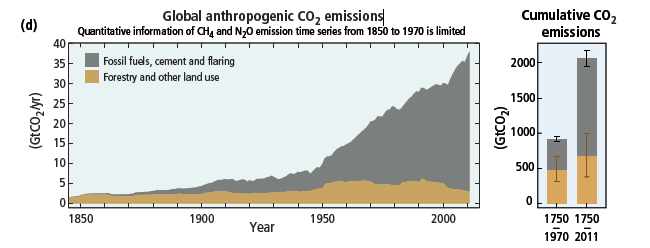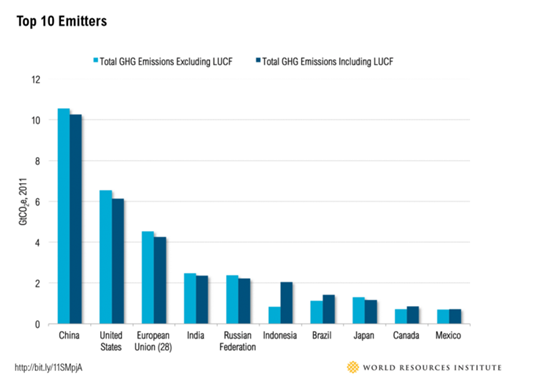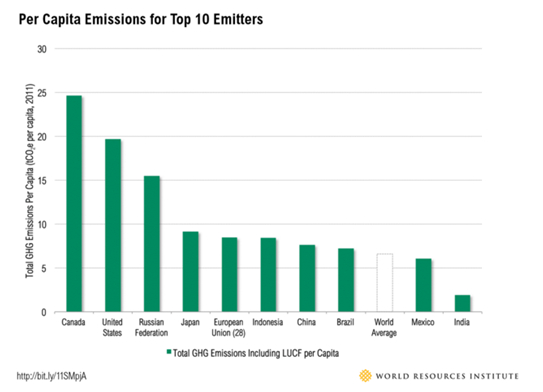Documentation:Open Case Studies/Political Science/Template
Global Climate Justice
Introduction
Goal and Objectives
The overall goal is to stimulate students to try to generate original ways to approach or frame the issue of global climate change that might provide a more productive path forward.
After successfully completing this assignment, students should be able to
- Contribute ideas to class discussions on the ethical aspects of climate change
- Collaborate with peers and their professor to develop proposals that could better address the ethical opportunities and obstacles for addressing climate change
- Discuss and appreciate the complexities around international negotiations and different levels of appropriate action from individual, local to global
- Collaboratively add to and edit content using the UBC Wiki
Framing the Problem
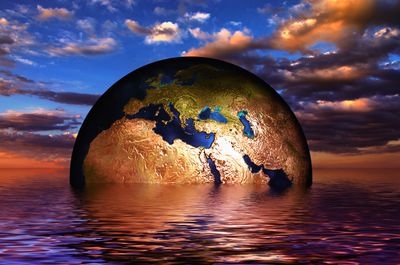
- What distribution of adjustment costs for climate change mitigation is fair, and should be acceptable to the most (important) countries?
- Are there ways of framing the issue that could be more effective in galvanizing effective action?
- Are problem-solving approaches to negotiating such environmental problems inadequate, such that more holistic ecological ethical approaches are needed? How feasible might be the adoption of such perspectives? Secondary case studies on the development of bans on killing of whales and use of animals for research might be able to show us the challenges and opportunities involved in how such changes may occur globally.
Context and Status of Climate Change
Significance of the Issue
- Human influence on the climate system is clear, and recent anthropogenic emissions of greenhouse gases are the highest in history.
- Industrialization and urbanization --> Anthropogenic GHGs emissions & Radiative forcing
- Recent climate changes is projected to have widespread impacts on human and natural systems under various future emission scenarios.
Two perspectives: human's impact causing climate change & climate change's impact forcing human to adapt / make changes
Impacts (what is at stake?)

- The most immediate effect of climate change is the increase of temperature, but the actual impacts of climate change stretch far beyond a “2 C° hotter summer”.
- The main impacts attributed to climate change include intensified extreme events: droughts, flooding, heat waves, cyclones & thunderstorms, and wildfires. As well as the following effects:
- Glacial melting & coastal erosion
- Water availability and distribution
- Disruption to ecosystem (abundance and activities)
- Impact on food production (a likely decrease in crop yield)
- Human health: pollution, spread of diseases
[2]
Source: International Geosphere-Biosphere Programme
Major Events
The first major conference on global climate change took place in Rio de Janeiro in 1982 and produced the Framework Convention on Climate Change. Subsequent rounds of negotiations have taken place in the form of preparatory meetings and subsequent conferences of states parties, including the 2009 Copenhagen Conference of the Parties to the Convention and the Paris Conference of 2015.
While assessments of these negotiations vary somewhat, far and away the predominant view is that the results of these global negotiations to date fall far short of what is required to ensure the planet stays below the 2 degrees Celsius temperature rise above pre-industrial levels that had been widely accepted as the goal to avert the most disastrous impacts of climate change (note: that goal was revised to 1.5 degrees Celsius at Paris 2015; we have already hit 1 degree rise!).
1990: Kyoto Protocol – more than 160 countries participated; target to reduce emission by 2012
*Side note: 55 developed countries participated; they constitute 55% of 1990’s emissions*
Key control mechanisms
(=what international community has come up with in distributing sustainable duties)
- Primary: national measures
- Additional:
- International Emission Trading
- The Clean Development Mechanism (CDM)
- Defined in Article 12 of the Protocol, allows a country with an emission-reduction or emission-limitation commitment under the Kyoto Protocol (Annex B Party) to implement an emission-reduction project in developing countries. Such projects can earn saleable certified emission reduction (CER) credits, each equivalent to one tonne of CO2, which can be counted towards meeting Kyoto targets [3]
- Joint Implementation
- Defined in Article 6 of the Kyoto Protocol, allows a country with an emission reduction or limitation commitment under the Kyoto Protocol (Annex B Party) to earn emission reduction units (ERUs) from an emission-reduction or emission removal project in another Annex B Party, each equivalent to one tonne of CO2, which can be counted towards meeting its Kyoto target. Joint implementation offers Parties a flexible and cost-efficient means of fulfilling a part of their Kyoto commitments, while the host Party benefits from foreign investment and technology transfer.[3]
- Defined in Article 6 of the Kyoto Protocol, allows a country with an emission reduction or limitation commitment under the Kyoto Protocol (Annex B Party) to earn emission reduction units (ERUs) from an emission-reduction or emission removal project in another Annex B Party, each equivalent to one tonne of CO2, which can be counted towards meeting its Kyoto target. Joint implementation offers Parties a flexible and cost-efficient means of fulfilling a part of their Kyoto commitments, while the host Party benefits from foreign investment and technology transfer.[3]
2012: Kyoto Protocol second commitment period -- Doha Amendment
- Essential Update: non-ratification of USA, and withdrawal of Canada
- Result: Amendment not yet in effect since 144 ratification is needed, but only has 65 so far. [4]
2015: United Nations Framework Convention on Climate Change (UNFCCC) at its 21st Session in Paris & Adoption of Paris Agreement
- Key features include:
- The first universal climate agreement where all 188 participating countries are expected to pledge national measures to curb emissions (not legally binding);
- Goal to “reach global peaking of greenhouse gas emissions as soon as possible, recognizing that peaking will take longer for developing country parties, and to undertake rapid reductions thereafter”;
- Publish greenhouse gas reduction targets and mechanisms, which will be reviewed and revised every five years;
- Call to establish “a new collective quantified goal” of at least $100 billion a year in climate-related financing by 2020 to assist developing countries to transition to clean energy and deal climate change adaptation.
2016: UNFCCC 43rd Session in Kairobi, Kenya
- The IPCC Panel decided to accept the UNFCCC’s invitation to provide a special report in 2018 on the impacts of global warming of 1.5 ºC above pre-industrial levels and related global greenhouse gas emission pathways, and to prepare a Special Report on this topic "in the context of strengthening the global response to the threat of climate change, sustainable development and efforts to eradicate poverty" [5]
2017: US Withdrawal from the Paris Agreement
- On June 1, 2017, US President Donald Trump announce the withdrawal of US participation in the 2015 Paris Agreement [6] However, defined in Article 28 of the Paris Agreement, US cannot effectively withdrawal before November 4, 2020. Thus, until the withdrawal takes effect, the US may still be obligated to maintain its commitments under the Paris Agreement as this action would be "inconsistent with international law and would not be accepted internationally" [7].
Contributors to this wiki are invited to post links to the most helpful concise summaries and assessments of the latest major international meetings and agreements.
Recent Statistics on International Emissions
Climate Change Resources and References
- ↑ Global Warming Briefing by Al Gore, Retrieved on 05/11/2016 from:https://www.youtube.com/watch?v=Jxi-OlkmxZ4
- ↑ International Geosphere-Biosphere Programme, Retrieved on 05/19/2016 from: https://www.youtube.com/watch?v=_EWOrZQ3L-c&feature=youtu.be
- ↑ 3.0 3.1 UNFCCC, Kyoto Protocol Website. Retrieved on May 20th 2016 from: http://unfccc.int/kyoto_protocol/mechanisms/clean_development_mechanism/items/2718.php
- ↑ UN Treaty Collection, 7 .c Doha Amendment to the Kyoto Protocol. Retrieved on May 20th, 2016 from: https://treaties.un.org/pages/ViewDetails.aspx?src=TREATY&mtdsg_no=XXVII-7-c&chapter=27&lang=en
- ↑ IPCC, Fifth Assessment. Retrieved on May 20th, 2016 from: http://www.ipcc.ch/report/sr15/
- ↑ "Paris climate deal: Trump announces US will withdraw". BBC News. June 1, 2017. Retrieved September 21, 2017.
- ↑ "Paris Agreement: Overview of Legal Issues". Retrieved September 21, 2017.
Additional Resources: Psychological Bias and Climate Change
- Understand Faulty Thinking to Tackle Climate Change. : by George Marshall - leading European experts in climate change communications.
- Don't Even Think About It - Why Our Brains Are Wired to Ignore Climate Change: George Marshall
- George Marshall's blog: http://climatedenial.org/
- Thinking Fast and Slow: Daniel Kahneman - Nobel Prize Winning economist looking at psychological principles in decision making: UBC Library link
- Video: It's The End of the World and We Know It and I feel Fine: Daniel Gilbert - Harvard Professor of Psychology talks about . TedX Academy
Comics to spice things up
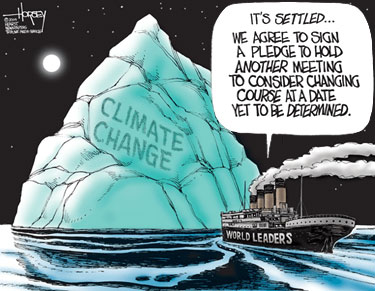
https://www.pinterest.com/pin/501799583454791488/
https://www.pinterest.com/pin/386605949233228852/
Political Science Perspectives
Collective Action Problem
One approach to this issue is to think of it in terms of a collective action problem. The scale of the climate change problem is such that individual and voluntary actions by citizens and corporations are not adequate to satisfactorily address the issue. Government policy is required. But governments around the world have not been able to collectively agree on who should bear what responsibilities. Without such coordination, governments are reluctant to get too far ahead of other countries insofar as they worry about being taken advantage of by other countries if they implement policy changes like regulations that are perceived as carrying a negative economic impact, or spending on programs that incur costs not born by other countries.
Moreover, some countries may think that their own individual contribution to climate change mitigation may not make that much of a difference, and thus be reticent to implement meaningful commitments. However, if many countries think this way, then too many will seek to avoid mitigation action, and too few will contribute. Some scholars in political science are skeptical that such collective action problems can be overcome by states, believing that states will protect their individual economic interests at the expense of the collective climate good. Others point to more successful efforts such as the Montreal Protocol dealing with ozone as demonstrating that sometimes states can create international institutions that coordinate their action, provide information and other benefits to produce shared commitments.
At the latest round of global climate change negotiations in Paris in December of 2015, countries made individual (rather than collectively agreed upon) commitments of what they are prepared to do. For up to date information on these Intended Nationally Determined Contributions (INDCs), click here. So far the skeptics would seem right on this particular issue. Unless state economic interests happen to converge, or the most powerful states in the system use their influence to push through action (regarded as highly unlikely), there is not much room for optimism from this point of view, particularly since powerful corporations often have great influence on government positions, and many such corporations have tremendous investment in sustaining carbon-based economies.
However, consider whether there is room here to explore how and why governments might act not just on short-term economic interests but on longer term interests and even other interests such as environmental ones? Some argue that the transition to a less carbon-intensive economies is technically and economically feasible.
Individual Psychology and Ideology
A second way of thinking about this issue focuses not on the international negotiating dynamics and state interests, but at the level of individual psychology and ideology. We know that humans have many biases when approaching complex social problems – to illustrate how they may operate importantly in this case, consider the following questions:
Climate change is a kind of problem that is a bad match for some of our powerful psychological biases. Namely, psychologists have found that:
- We tend to have trouble imagining a future drastically different from the present.
- We tend to block out complex problems that lack simple solutions.
- We tend to dislike delayed benefits and so are reluctant to sacrifice today for future gains
- We tend to find it harder to confront problems that creep up on us than emergencies that hit quickly.
Tom Toles has a great comic comparing humankinds' approach to climate change to the famous experiment that showed while frogs will jump out of a pot of hot water if they are dropped into it, they will sit in a pot of mild water until it gets so hot it boils - we can't post it here but google it and find it!
These biases may help explain why climate change appears to have not yet aroused sufficient citizen concern in enough countries to make it impossible for governments to continue to avoid making adequate commitments for climate change mitigation. On the other hand, there are other kinds of psychological triggers that perhaps could be tapped into to garner more support – for example, fear is often a very powerful, primal motivator. But framing climate change in fearful terms (perhaps like Al Gore's well-known film Inconvenient Truth - see what reaction you have to this film) may lead to avoidance of the issue – are there empowering framings that might more successfully tap into some of our psychological tendencies?
Thanks to Professor George Hoberg of the Liu Institute from whose lectures some of this material is drawn.
Political Philosophy
A final way of approaching this issue that will be considered here has been to think more like a political philosopher and identify what the most just or fair approach to this issue might be that all or most could agree to in terms of who has the responsibility to do what. These approaches focus on issues such as whose practices to date have caused global climate change, whose practices now are contributing to climate change, who has benefited from the industrialization processes that have produced climate change, and who has the ability to pay. So, should the industrialized countries whose activities have caused most of climate change - US, Canada, Europe, Japan - be the ones who bear the burdens of climate change mitigation? That is what China and India, for example, have argued. Or, should China now bear an equal or greater responsibility since it is now the single biggest emitter of climate change causing emissions? A key principle in such environmental negotiations including the 2015 Paris agreement has been the notion of accepting "common but differentiated responsibilities and respective capabilities," which means that not all countries are in an equal position to address climate change.
A recent debate has been taking place on the desirability of focusing on issues of fairness and justice, or downplaying such concerns in favour of effectiveness. See the short article by prominent International Relations scholar Robert Keohane.
What Would A Political Scientist Do?
See what principle(s) you think you can come up with that might breakthrough the inability of the international community to produce a formulation that the key countries agree is fair and that would be more effective than current approaches.
Review previous student action plan proposals below and bring your own ideas to discuss in our in-class brainstorming sessions: Are there other ways of approaching this issue that might be more productive, or avenues within the above approaches that might be useful? Previous generations have largely failed in this monumental challenge, it is up to your generation! The class activity pushes you to consider how to translate what you may think is a fair approach into practical ethics.
Student Action Plans
The following are links to action plans that are created by Political Science students. They are grouped according to who is most responsible for the proposed action to address climate change.
Advocacy Groups/Individual action
1: Individuals in Developed Countries -- 2: Lab Meat -- 3: Food Waste -- 4: Clothing Waste -- (Template 5) -- (Template 6) -- (Template 7) -- (Template 8) -- (Template 9) -- (Template 10)
Industry/Technology/Corporations
1: BC Hydro -- 2: Oil and Mining -- 3: Automotive -- (Template 4) -- (Template 5) -- 6: Vancouver Restaurant Industry -- (Template 7) -- (Template 8) -- (Template 9) -- (Template 10)
Local / Municipal Governments
1: Housing and Infrastructure -- 2: Public Transport Systems -- (Template 3) -- (Template 4) -- (Template 5) -- (Template 6) -- (Template 7) -- (Template 8) -- (Template 9) -- (Template 10)
Regional / Provincial / State Governments
1: British Columbian Government -- 2: Plastic Tax and Weaving Plastic Bags -- (Template 3) -- (Template 4) -- (Template 5) -- (Template 6) -- (Template 7) -- (Template 8) -- (Template 9) -- 10: Melt Away Plastic Bags
National Governments
1: National Carbon Legislations -- 2: Canadian Government -- 3: Canadian Green Energy -- (Template 4) -- (Template 5) -- (Template 6) -- (Template 7) -- (Template 8) -- (Template 9) -- (Template 10)
International Organizations / Agreements
1: Collective Responsibility for the development of GMOs -- 2. Paris Climate Agreement -- (Template 3) -- 4. Hybrid Model -- (Template 5) -- (Template 6) -- (Template 7) -- (Template 8) -- (Template 9) -- (Template 10)--
